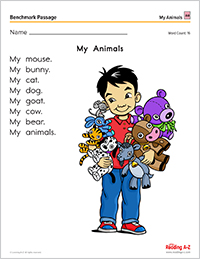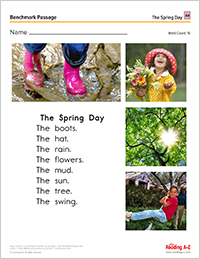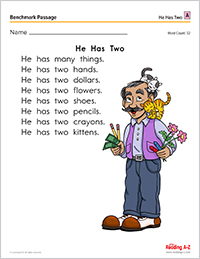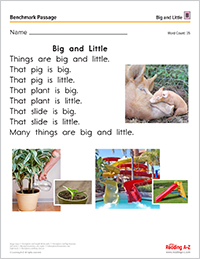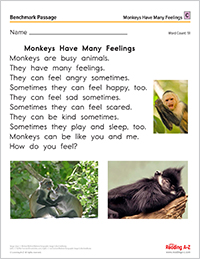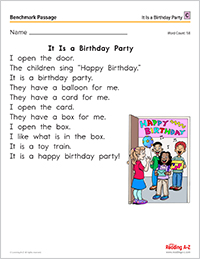Utilizing student data and monitoring academic progress are essential to literacy development, especially if you use Science of Reading-aligned instruction. One tool many educators are familiar with to complete these tasks is the Benchmark Assessment, but we’ve got another resource to add to your educational toolbelt. Introducing Benchmark Passages, our version of the Benchmark Assessment tool with a few changes. In this blog, we’ll take a deep dive into the Benchmark Passages we offer, the optimal way to use this tool, and explore a few examples to help you strengthen reading comprehension, monitor student progress, and more.
What are Benchmark Passages?
Upon the introduction of The No Child Left Behind Act in 2001, it became increasingly important to measure and improve academic results. Though the initial emphasis was placed on state testing, teachers learned that results from state testing often arrived a little too late as far as learning intervention was concerned. To remedy this, teachers began to administer regular assessments to inform instruction and produce statistically significant learning gains long-term.
It was this era that birthed the idea of Benchmark Assessments or, as we call them, Benchmark Passages. Benchmark Passages are a crucial component of our three-part assessment process that provides the ongoing data necessary to address academic objectives on a school, district, or classroom level in a way that is comprehensive, continuous, and coherent. At Learning A-Z, our Benchmark Passages utilize short passages to evaluate instructional reading needs and assess overall reading behavior and comprehension.
Benchmark Passages and the Science of Reading
Created to articulate what truly matters and works for literacy instruction, the Science of Reading research requires teachers to actively observe and make adjustments based on learning outcomes. To make those adjustments, it is imperative to administer regular check-ins and collect student data. Benchmark Passages help you with this process by:
- Introducing students to new texts while allowing student behavior to be recorded
- Administering an assessment to evaluate reading comprehension
- Providing comprehension questions to further evaluate comprehension at that student’s specific reading level
- Rewarding student progress, encouraging students to remain engaged and enjoy reading
How do Teachers use Benchmark Passages?
Available in our award-winning solution for literacy instruction, Raz-Plus, our Benchmark Passages simplify the collection of student data while painting an accurate picture of the learning opportunities for each student. To use these passages, you can follow the following steps:
- Identify a Benchmark Passage that the student has never seen before or use the fiction-nonfiction topic pair at each level for more familiar texts. Once selected, teachers can then assign Benchmark Passages to their students using Kids A-Z.
- Use the Running Records to record the student's reading behavior and score their recordings.
- If a student scores 90 percent or higher, you can assess comprehension using a Quick Check from Levels A-Z and Retelling Rubrics.
- If a student scores from 90%-94% percent on the running record and answers comprehension questions at 80%-100%, he or she is at the appropriate instructional level.
- Use Benchmark WOWzers to reward students as they progress from level to level.
Free Benchmark Passages
Raz-Plus offers a wide variety of Benchmark Passages that are sure to pique your students’ interest while aligning with Science of Reading and simplifying the differentiation of instruction. Take a look at a few downloadable sample passages below.
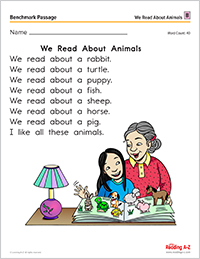
We Read About Animals
A child and an adult read a book about some animals.
Genre: Fiction
Level: B
Lexile 50L
Strengthening Literacy Proficiency With Benchmark Passages
With the power of the Benchmark Passages available in Raz-Plus, teachers can easily evaluate academic performance, differentiate instruction, and meet students where they are. As you continue on your Science of Reading journey, we recommend you take a look at the sample Benchmark Passages above and sign up for a free trial of Raz-Plus (no credit card required) to experience the difference first-hand.
Differentiate Instruction and Strengthen Reading Comprehension
Experience the impact of Benchmark Passages with a free trial of Raz-Plus.
Sign Up- Herman, J. L., Osmundson, E., & Dietel, R. (2010). Benchmark assessments for improved learning (AACC Policy Brief). Los Angeles, CA: University of California.
- Jiban, Cindy. “Decisions, Data, and Doing the Science of Reading.” NWEA.Org, NWEA, 16 May 2023, www.nwea.org/blog/2022/decisions-data-and-doing-t...


